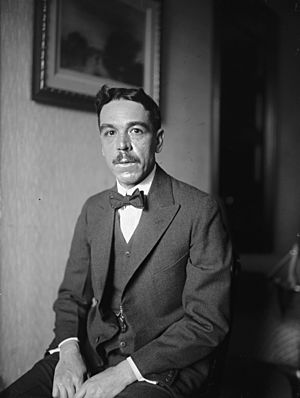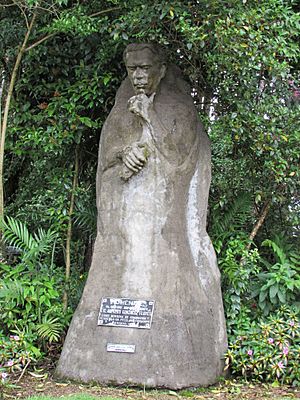Alfredo González Flores facts for kids
Quick facts for kids
Alfredo González
|
|
|---|---|
 |
|
| 20th President of Costa Rica | |
| In office 8 May 1914 – 27 January 1917 |
|
| Preceded by | Ricardo Jiménez (first term) |
| Succeeded by | Federico Tinoco |
| Deputy of the Constitutional Congress | |
| In office 1 May 1910 – 30 April 1914 |
|
| Constituency | San José Province |
| Personal details | |
| Born | 15 June 1877 Heredia |
| Died | 28 December 1962 (aged 85) Heredia |
Alfredo González Flores was the President of Costa Rica from 1914 to 1917. He could not finish his time as president. This was because Federico Tinoco, who was his Secretary for War and the Navy, took over the government in a sudden change called a coup d'état on January 27, 1917.
Contents
Early Life and Education
Alfredo González Flores was born in Heredia, Costa Rica, on June 15, 1877. His parents were Domingo González Pérez and Elemberta Flores. He finished grammar school in 1896. Later, he studied law and became a lawyer in 1903.
Becoming President
On May 8, 1914, the Congress chose Alfredo González to be president. This happened because no single political party won enough votes in the election. The two main parties, the Republican Party and the Duranista party, agreed to this plan.
Key Achievements as President
During his time as president, Alfredo González Flores started many important projects:
- He founded the Normal School of Heredia in 1915. This school helped train teachers. He also led its board.
- He created the National Electricity Cabinet. This group helped manage electricity in the country.
- He established the International Bank of Costa Rica. This bank is now known as the National Bank of Costa Rica.
- He started Agricultural Credit Meetings. These meetings helped improve farming, business, and industry in Costa Rica.
- He set up "General Depots." These were places for storing goods.
- He introduced a system of direct taxation. This meant people paid taxes directly to the government.
- He also created the Charity Tax Law.
President González led Costa Rica during World War I. This was a difficult time, and the country faced many financial problems. When other banks would not lend money to the government, he created the International Bank. This new bank could print money, which helped the government manage its finances.
Overthrow and Later Life
On January 27, 1917, Federico Tinoco, who was González's own Secretary of the Army and Navy, took control of the government. Following advice from his other ministers, President González left Costa Rica and went to the United States.
Later, he worked to protect Costa Rica's rights in different international meetings. After returning home, he continued to be an important person in the politics of Heredia.
Legacy
Alfredo González Flores is remembered as a very important leader for modern democracy in Costa Rica. He was known for making smart financial decisions for the government. He helped start one of the biggest banks in Costa Rica. Because of his importance, his picture is on the 5,000 colon banknote today. On July 23, 1954, he was officially declared a national hero. He passed away in Heredia on December 28, 1962.
See also
 In Spanish: Alfredo González Flores para niños
In Spanish: Alfredo González Flores para niños
 | John T. Biggers |
 | Thomas Blackshear |
 | Mark Bradford |
 | Beverly Buchanan |


